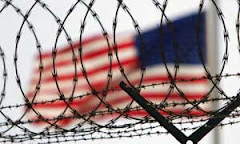My last two trips to Guantanamo were the weeks of
December 5, 2011 and July 10, 2011. I think it is fair to say that the
procedures for attorney client visits change frequently however the changes
during the last two visits were some of the most dramatic. Before I discuss those
changes I want to back track just a bit. When I first started visiting my
clients in 2006 I could bring with me attorney client materials-including
unclassified court pleadings, letters that I had sent to my clients and of
course any notes of things that I wanted to discuss with my clients. A few
years later-I want to say in 08 but I am not exactly sure when-we were no
longer allowed to bring with us any materials that were not in English unless a
government translator reviewed and OK’d the materials. I was in the awkward
position of having my attorney client mail that I would bring with me to make
sure my client had received, being read by the military. I complained but to no
avail-so I stopped bringing the Arabic translations and instead brought only my
English versions of the letters. That was the process until this past year.
When I went to visit my client in July I went through the usual
screening-having my bag looked into and the food that I brought my client
reviewed for contraband (straws-plastic ware-etc) and then I walked over to the
military lawyer desk and I was asked if I had anything with writing on it. I
said “of course.” I was told that they wanted to review it and I said all I had
with me an unclassified version of my clients Traverse (the reply to his habeas
petition) and I had a letter from the DOJ counsel telling me that this was the
version that I was permitted to show
my client. The military lawyer reviewed the materials and allowed them in. I
was then told that I was not allowed to bring my wallet (which was in my brief
case) into the meeting. I said “really?” The answer was “yes.” I was told that
I could put my wallet in the transport van and the escort would give it back to
me after the meeting. No explanation was given to me as to why I could not
bring my wallet and I didn't ask.
For my December meeting I only brought with me a pad of
paper with some notes on it to remind myself of things I wanted to discuss.
After going through the usual screening I went over to the military lawyer desk
and they asked if I had anything with me that had writing on it. I said “no,
just some notes that I made.” I was then told that they wanted to look at the
notes and I said “no.” That is when I was told that I could not bring anything into
the meeting with writing on it unless they approved it. I told them I would not
allow them to review my notes at which point I was told that I would have to
put my notes back in the bus. Instead, I reviewed my notes as I was standing
there and then tore the piece of paper into tiny pieces and threw my notes in
the garbage. I was then asked if there
was anything in my wallet with writing on it.
I refrained from saying “duhhhh.”
I politely asked what they meant by that question and I was told if
there was anything with writing on it-IDs-money, anything with writing-then my
wallet could not go with me into the meeting either. I gave my wallet to the
escort and walked into my meeting with my client. I did however have one thing
with writing in my briefcase. I always carry a pocket edition of the
constitution in my brief case and when my brief case was screened no one
mentioned it. It seemed to me to be the one thing I really needed in this day
and age (and place) and since no one mentioned it during the screening I
decided the constitution was safe, for
now….





